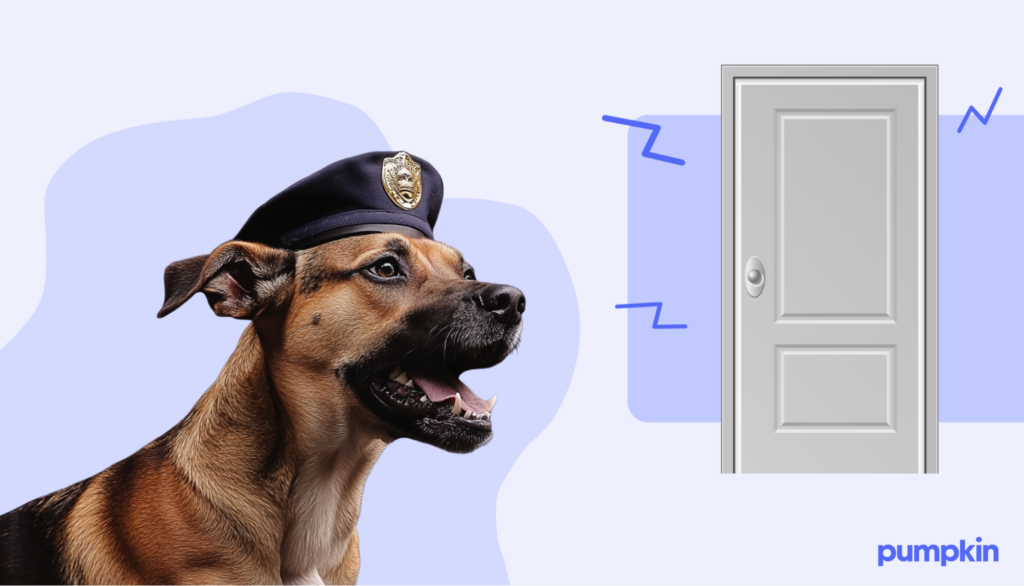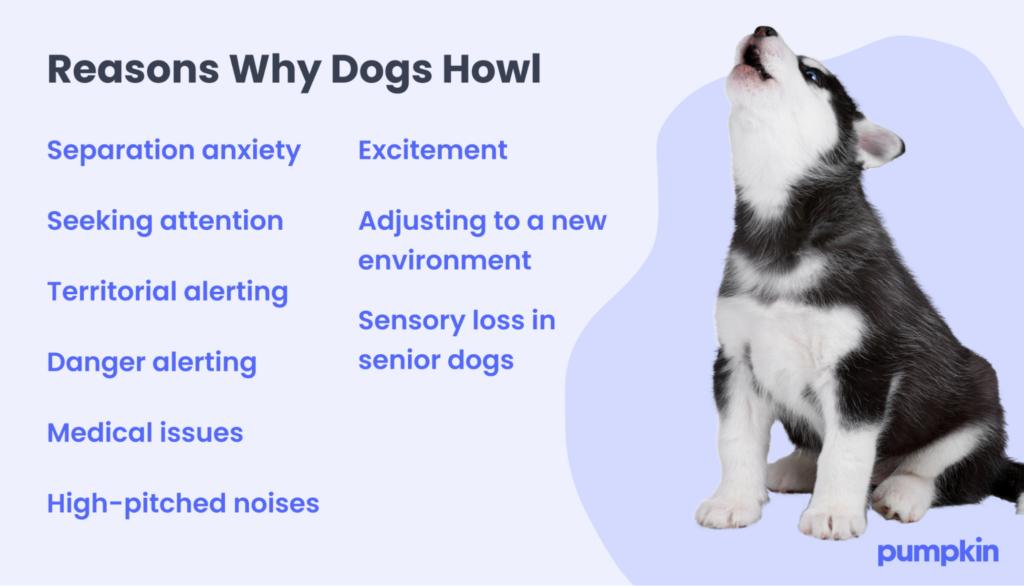Key Points
- Dogs howl for a variety of reasons, including instinct, separation anxiety, loneliness, and excitement.
- Howling is a form of communication reminiscent of dogs’ wolf ancestors, and it’s normal canine behavior.
- Reward-based training and positive reinforcement may be able to curb excessive howling.
When you hear your dog emit a deep, mournful “aroooo” as they’re lying on the couch on a random Tuesday, you may wonder what’s caught their attention.
We’re taught to associate howls with wolfpacks singing to the moon, but what does it mean when the sound is coming from your domesticated pup?
Just like barking, whining, and growling, howling is simply another way dogs communicate with us (and each other). It can mean a variety of different things, and in most cases, it’s not a cause for alarm. Understanding what your dog is trying to say is crucial in determining how to meet their needs.
Where does howling come from?
Howling is hard-wired into some dog’s genes, a remnant of their ancestry to wolves. Whether they’re communicating their presence to neighboring dogs, claiming their territory, getting your attention, or signaling distress, howling is a multi-faceted form of canine communication.
Think of howling as a long-ranged doggy telephone call. When wolves howl, they raise their noses to the sky and let off a sustained tone. This sound is meant to travel long distances and trigger their pack to join in. Interestingly, howls are unique to the individual dog or pack.
Some dog breeds howl more than others. Hunting dogs in the hound groups, which include Basset Hounds, Bloodhounds, Dachshunds, Beagles, and Coonhounds, for example, howl to signal that prey is present and ready for the hunter. These noises are called bays rather than full-throated howls. The bay is a deep-toned, prolonged barking sound, and more enthusiastic than a mournful howl.
Dog breeds that resemble wolves, like the Alaskan Malamute and Siberian Husky, are highly vocal and will howl to communicate with anyone who’ll listen. They vocalize in howls, yips, and barks to communicate with their pack members.
So why is your dog howling?
Common reasons dogs howl
Whether your pup is trying to communicate with a family member or a neighborhood dog, here are a few common reasons dogs howl.
Territorial alerting
Dogs howl to warn other dogs of their presence (the howling sound can travel several miles). If they sense an intruder, the howling can warn others to stay away from their territory. It’s their way of saying, “This is my domain, and I want everyone to know it.”
Separation anxiety or loneliness
If your dog howls while you’re away from home, this can be a signal of separation anxiety or loneliness. This is the most common reason for incessant howling.
It’s usually accompanied by other signs of loneliness, such as pacing, elimination accidents, destructive behavior, and barking. If this is the case for your pup, talk to your vet or a certified professional dog trainer (CPDT) to learn some ways to reduce their stress.
Attention seeking
A bored dog may howl to get your attention. Remember that any attention will work for your beloved pooch. Be it good or bad, they got your attention.
If your dog is howling to get attention, you can discourage this behavior by not giving it to them right away. This can help show them that howling doesn’t automatically result in the attention they’re craving. Plus, just like with excessive barking, it’s helpful to teach your pup a word that signals them to be quiet.
Danger alerting
When dogs sense danger or potential predators, they will howl to alert their humans. There are many stories and videos on social media about dogs saving lives by howling to alert humans of danger.

Medical issues
When dogs are in pain or uncomfortable, they can howl. This is the troubling side of howling and indicates that you need to see your veterinarian to rule out injury or health issues.
Pet Pro Tip: Illnesses won’t wait to happen. It’s never too early to enroll in pet insurance. From common parasite infections, to costly hereditary illnesses, pet insurance can be worth it and can cover crucial eligible treatment your pet may need for their unexpected accidents and illnesses. Find out how pet insurance works, what pet insurance covers, and choose a plan today.
High-pitched noises
Sirens or other high-pitched sounds, like singing or musical instruments, can trigger some dogs into pretty amazing howls.
Some say it’s because the sounds resemble a distant dog howling, while others believe it hurts their ears or causes them discomfort. There isn’t much proof of either theory, but we know dogs howl in response to loud noises.
Excitement and happiness
If you’ve ever been around an Alaskan Malamute, you’ve undoubtedly heard some enthusiastic howling on your arrival, or when playing. Dogs will howl to convey excitement and happiness, and it’s the most heartwarming kind of howl.
Adjusting to a new environment
If you have a new dog that appears to be howling for no apparent reason, they may be trying to call their former family or to convey their presence to neighboring dogs. It will stop as your pup gains confidence and security in their new environment. Patience and rewards-based training methods will help during the transition.
Sensory loss in senior dogs
Senior dogs can become howlers, especially at night, when they are experiencing cognitive decline or losing their hearing and sight. When they don’t see or hear well, it can trigger confusion and howling for your attention to reassure them of their surroundings. This is another good reason to visit your vet or an animal behaviorist. Together, you can figure out how to adapt your dog’s environment to accommodate sensory loss.
How to stop unwanted howling
If your dog is howling too much, there are ways to calm them down and provide counter-conditioning. Let’s look at how this is done.
Positive reinforcement, or reward-based training, is the most effective way to stop unwanted canine behavior. This is true for the incessant howler. The key to stopping your dog’s howling is to determine the reasons for it.
As we mentioned, your dog may howl because they’re in pain or experiencing confusion, especially f they’re a senior pup. In these cases, take your dog to the vet. But if they’re howling for other reasons, you may be able to work on this behavior at home.

If your dog has separation anxiety…
Separation anxiety howling can be difficult to stop. It may require the skills and experience of a certified professional dog trainer, veterinarian, or animal behaviorist.
But before you hire a professional, here are some steps to try:
- Avoid leaving your pup home alone all day. If you have to go into the office, arranging for a dog walker or dog sitter to come can help, as well as taking them to doggy daycare.
- Stick to a regular routine. Leave the house and come back at the same times every day, and have a dog walker come at the same time every day.
- Give your dog physical and mental exercise before you leave them home alone. You could take them on an extra-long walk, play with them, do some training exercises, or give them puzzles for mental enrichment.
If loud noises are causing your dog to howl…
Howling for sirens and other high-pitched noises requires counter-conditioning. When you expect or hear the noise that triggers your pup, offer a toy or reward for them to come to you and sit. It’s all about distracting them until the noise stops.
When you reward good behavior — in this case, not howling or barking — they should slowly become desensitized to the noise that’s causing them to howl.
Start by rewarding your pup right after they quiet down. Then, stretch out the time frame and reward them after 30 seconds of quiet, then one minute, and then five minutes. You can also try treating them randomly when they’re being quiet and calm. Finally, start teaching them a quiet cue, which can also help with excessive barking.
If your dog is howling with excitement…
Some dogs get the zoomies, and some like to howl. If your dog is howling from excitement, try to redirect them to express their excitement in another way. First, figure out if they’re more motivated by treats or toys. Then, play with them or do a training exercise to direct their excited energy to another activity.
Howling myths and folklore
You may have heard of other reasons for howling that stem from folklore and myths. There’s no solid proof to these myths, but most of us dog people find them interesting, nonetheless.
Warning of natural disasters
It’s said that pups howl to warn about impending natural disasters like earthquakes and dangerous storms.
There is some research behind this theory, as studies have shown that dogs can exhibit stress behaviors like howling and barking within hours or minutes of an earthquake. But scientifically, it’s not likely that your dog is directly predicting an earthquake.
It’s more likely that their heightened senses are reacting to earthquake precursors, like underground rocks rubbing against each other. So while this theory is steeped in folklore, it’s possible that with more research, there may be a day when dogs can help us predict natural disasters.
High tide
Some myths say dogs will howl to warn of high tides. Since the moon controls the tides, and some believe that dogs raise their heads to howl at the moon, it’s thought that dogs can warn us about tidal changes.
However, there is no real scientific evidence to back this up. Dogs may howl for all of the reasons we mentioned earlier, but there’s no research that shows that they howl at the moon.
Unseen spirits
Folklore says that if a dog howls for no reason, it can mean an unseen spirit is present and visible to the dog. Personally, we think the ghost theory is underrated as a potential explanation of dog howling.
Howling: Just another form of communication
Ultimately, howling is a normal form of communication for your pup that can have many explanations. Investigating the reasons for your dog’s howling is key to understanding what your pup is trying to tell you.
If the howls are incessant and home training isn’t working, then it’s time to tap in a professional trainer. Because this behavior is rooted in our dogs’ genetic code, it can take serious training to overcome this behavior.
- https://vcahospitals.com/know-your-pet/why-do-dogs-howl
- https://wolf.org/wolf-info/basic-wolf-info/biology-and-behavior/communication/
- https://www.zoetispetcare.com/blog/article/why-do-dogs-howl
- https://www.sciencedirect.com/science/article/abs/pii/S0168159199000118
- https://study.com/academy/lesson/why-do-dogs-howl.html
- https://www.aspca.org/pet-care/dog-care/common-dog-behavior-issues/howling
- https://www.akc.org/expert-advice/lifestyle/why-do-dogs-howl-to-music/
- https://vcahospitals.com/know-your-pet/moving-with-your-dog
- https://www.aspca.org/pet-care/dog-care/common-dog-behavior-issues/behavior-problems-older-dogs
- https://veterinarypartner.vin.com/default.aspx?pid=19239&id=9673053
- https://www.akc.org/expert-advice/lifestyle/can-dogs-predict-earthquakes/




